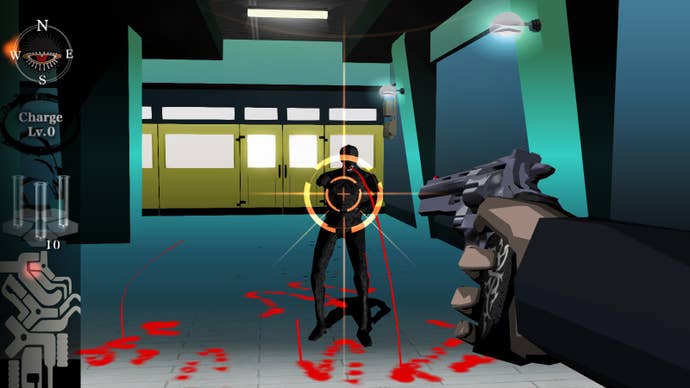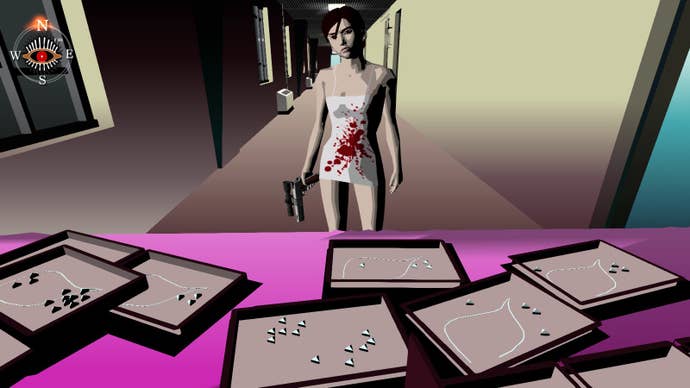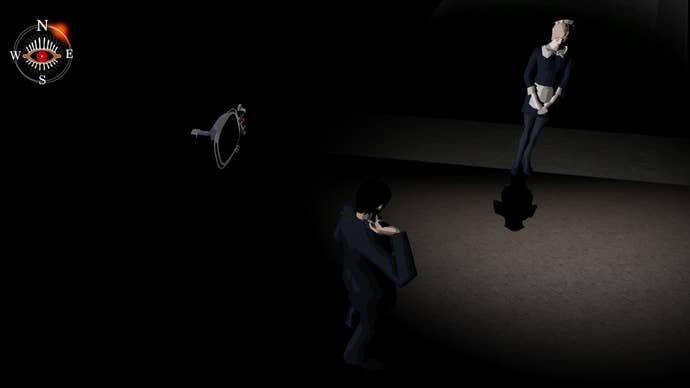Suda51 Revisits Killer 7 To Talk About Cut Content, A Potential Sequel, and His Favorite Character
At PAX West 2018, Killer 7 writer, director, and designer Goichi Suda fill us in about his cult classic's upcoming PC remaster.
This article first appeared on USgamer, a partner publication of VG247. Some content, such as this article, has been migrated to VG247 for posterity after USgamer's closure - but it has not been edited or further vetted by the VG247 team.
When you create something, usually there's an "aha!" moment where you realize you're on the right track. For Goichi "Suda51" Suda in leading development on the 2005 cult shooter Killer 7, that moment came in a particular boss fight featuring two old men. They're members of the faux-political party central to the entire game: the Japanese United Nations Party. Only the old men aren't what you'd expect at the point you're pointing a gun at them. They're half-dead, with their brains exposed and their eyes falling out of their skulls. They throw chunks of their brains at you. Sometimes in the midst of battle, one adjusts the tie for the other.
It's deeply unsettling. But that's precisely what made Killer 7 stand out in the west when it released for the PlayStation 2 and GameCube, Suda's first game released outside of Japan.

"I felt that that [boss fight] was kind of the turning point when I realized that this game was going to be something special," Suda tells me at PAX West 2018 through a translator. "I actually showed that part to [Shinji] Mikami-san, who was the producer on the game at Capcom. Mikami-san was shocked in a good way, like 'oh my god.' He hit the table and he's like, 'This is awesome. I don't think anybody else can make something like this. This is really cool.'"
In Killer 7, you play as a diverse group of assassins who work on behalf of the United State. You switch between members of the group, literally called "killer7," shooting "Heaven Smiles" (recognizable from their distinct shriek) into dust clouds of blood. There's a catch though—the assassins are the split personalities of wheelchair-bound Harman Smith, who absorbed their souls back when they all died on a particular mission. Garcian Smith is the dominant personality of the bunch, and the majority of the seven assassins don't hold much sway in the overarching narrative of shadow governments, the inevitability of war, and so on.
Killer 7 is due for re-release on Steam later this year, its first release beyond its original. The biggest difference is that it'll have a much larger 16x9 ratio rather than its 4x3 original resolution. With its signature cel-shaded art style (Suda specifically highlights Mike Mignola's Hellboy comics as a big inspiration), the remaster visually holds up remarkably well—and yes, it still controls just as obtusely as it once did.
It's just the latest in a recent avalanche of the famed "punk" developer's older works resurfacing. In 2017, Suda's first game with Grasshopper Manufacture, The Silver Case, was remastered; its first time released overseas. A remake of its mobile sequel The 25th Ward followed it this year. A Flower, Sun, and Rain remaster has also recently been teased. On that front, Suda notes that there's "nothing to report at the moment," though they've been in contact with a studio they "trust" and are waiting for the timing to work out between the two of them. The NIS America published Killer 7 takes priority for now, and it's just around the corner.
"Not a lot of these games are really in a position to easily be played anymore and so to be able to bring this to people, it's not something that every creator gets an opportunity to do. So just having an opportunity to do that and to bring them to a whole new group of people, I feel really happy about that," Suda says. "Going to a lot of events on promotions for other games—[like] PAX or over in Europe or various events elsewhere—meeting a lot of people, fans, other creators, things like that; all of them, many of them will always say, 'Killer 7 was so important to me.' Or, 'it had this huge impact on me, changed my life' kind of thing. Seeing that and realizing just how much of an impact it had on others, I really wanted to let young gamers have a chance to experience this for themselves. So that was kind of the main impetus behind 'Why now, why this?'"

Killer 7 is known for a lot of things: Its obtuse sorta-on-rails control scheme, its puzzle-centric levels, its cel-shaded art style, its twisty story, its depictions of violence and sex. Perhaps it's most known for its controversy though. Notably, it imagines a "future" (now present) of what would happen should Japan and United States relations grow strained again, casting off post-World War 2's Article 9 of the Japanese Constitution that forbids Japan to host armed forces for war purposes. The PS2 release in Japan was even censored to some extent for its disturbing scenes. Killer 7 has always stewed in controversy, and its re-release will likely not be an exception—especially in today's political climate, both in the United States and in Japan.
"Yeah, it is pretty coincidental," Suda says of its release timed for this year. "That said, you know in Killer7 it's obviously, as you mentioned, about Japanese American relations and particularly Japanese relations set in the future. [It's] kind of predictive. So the fact that now, here we are, with the situation that we're in. It's really interesting, it's a coincidence but it's an interesting and good coincidence and it's actually perfect timing almost."
Spoiler Warning: Spoilers for the ending of Killer 7 below.

Even with its multicultural band of assassins, Suda's favorite character actually comes from the antagonists' end, in the form of Matsuken (full name Kenjiro Matsuoka), one of its few Japanese characters. "I poured the soul of Japan into the character, and there's something really unique about him and I took a lot of care in making and writing him," Suda says. "To go a little bit deeper into his creation, just this idea of, you know, he gets things done. [He's a] politician; it's representative, or has to represent a whole group of people. And in my way, I poured my hopes and wishes into what I wished [that] maybe Japanese politicians or leaders would be a little bit more forthcoming with things, a little bit more strong. So in addition to having this cool character that I made, it's also like [I] wish we were more like this."
Matsuken is one of the main antagonists of Killer 7. At the end, following overcoming Heaven Smiles leader Kun Lan, a huge decision rests on what to do with Matsuken. If you kill him, then the United States destroys Japan in a ruthless bombing. If you don't kill Matsuken, then he's seen in an end credits cutscene semi-victorious on a battleship, launching a "full-scale" attack on the United States in 2014. There is no good or bad ending in Killer 7. No matter what, the two nations are bound to violent fates.
At the start of Killer 7, Matsuken is a young and timid politician. After some taunting by the two elderly men in that very pivotal boss fight for Suda, Matsuken shoots them both before turning the gun on himself. Then he stops short, "awakened" by villain Kun Lan after being touched by his God Hand (which turns people over to the side of the Heaven Smiles terrorist organization). After that, Matsuken transforms into a strong-willed, decisive individual; the manifestation of what Suda wishes the politicians of Japan had an inkling of. But he's also super duper evil, obviously.

Killer 7 is still one of Suda's most talked about games. With the re-release of Killer 7, it's possible that Suda will get the chance to revisit it again, but only if Capcom's interested. "I'd certainly think of something and try something else [if Capcom asked]," he says when I ask about the potential of a pure sequel. "But by the same token, this is a game that Grasshopper put its all into, and it's all very complete and rounded in what it is, so I'm pretty happy with how it is.
"However, one thing that's important to note is that actually, what made it into the game is only one third of what was written. There's two thirds kind of on the cutting floor. So rather than maybe a sequel, one thing I'd love to do would be to make a complete version of the game where we're able to put in all the stuff that had been cut. So that's why it's really important for NIS America to make sure this game does well, to maybe help realize things like that. Which would allow Capcom to maybe revisit the game overall and say, 'Hey maybe there's something else we can do here.'"
It's hard to deny the accidental timeliness of the upcoming re-release of Killer 7. When Killer 7 was being made, the United States was waging war with Iraq, while today we have arguably the most reckless administration in our country's history; meanwhile Japan's Liberal Democratic Party remained in power, and still is in power to this day under the controversial Shinz? Abe administration. I ask Suda if he feels the same way about politicians today as he did when he made Killer 7 over 13 years ago. He laughs and nods emphatically. "Oh yeah. Right now too, of course. Absolutely."
Disclosure: USgamer is owned and operated by ReedPop, which also runs the PAX family of shows.

